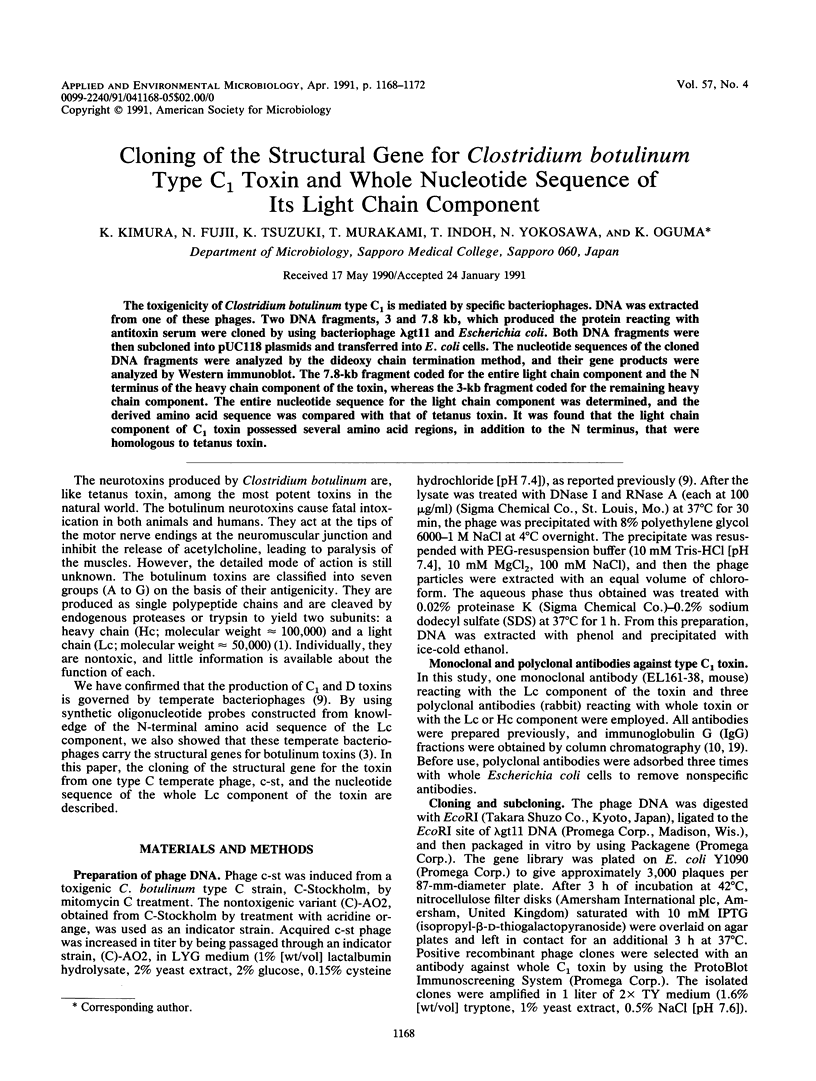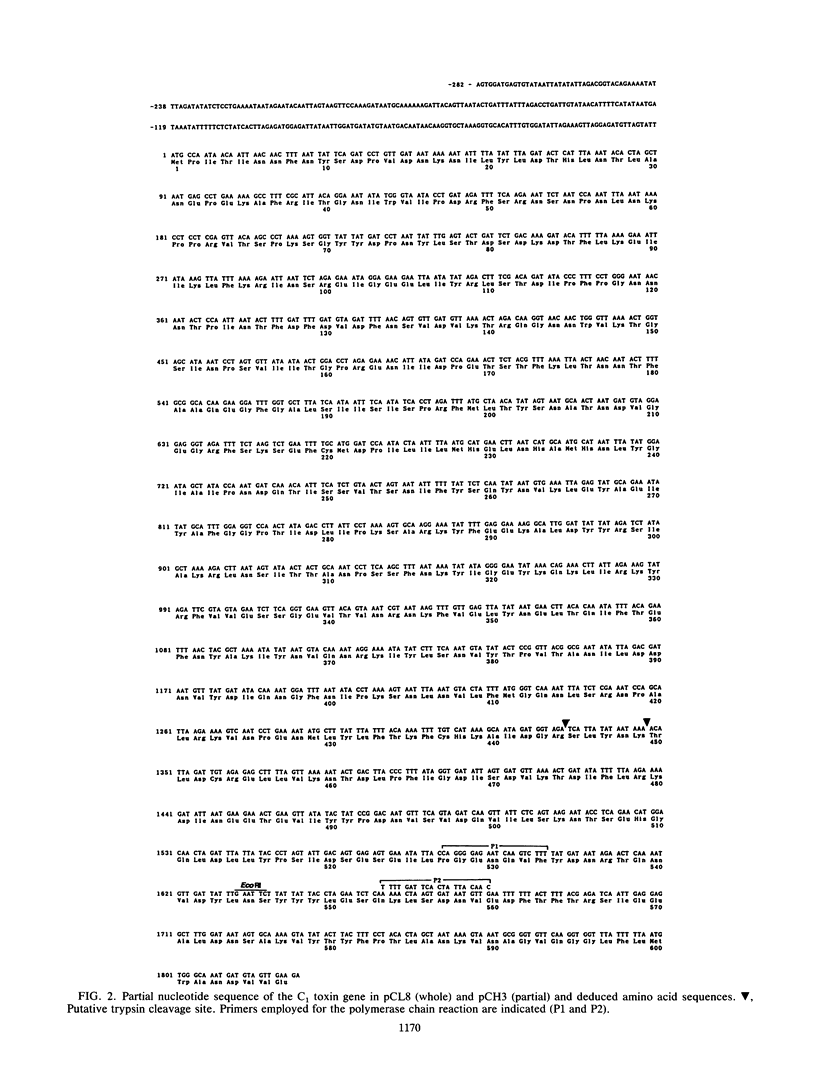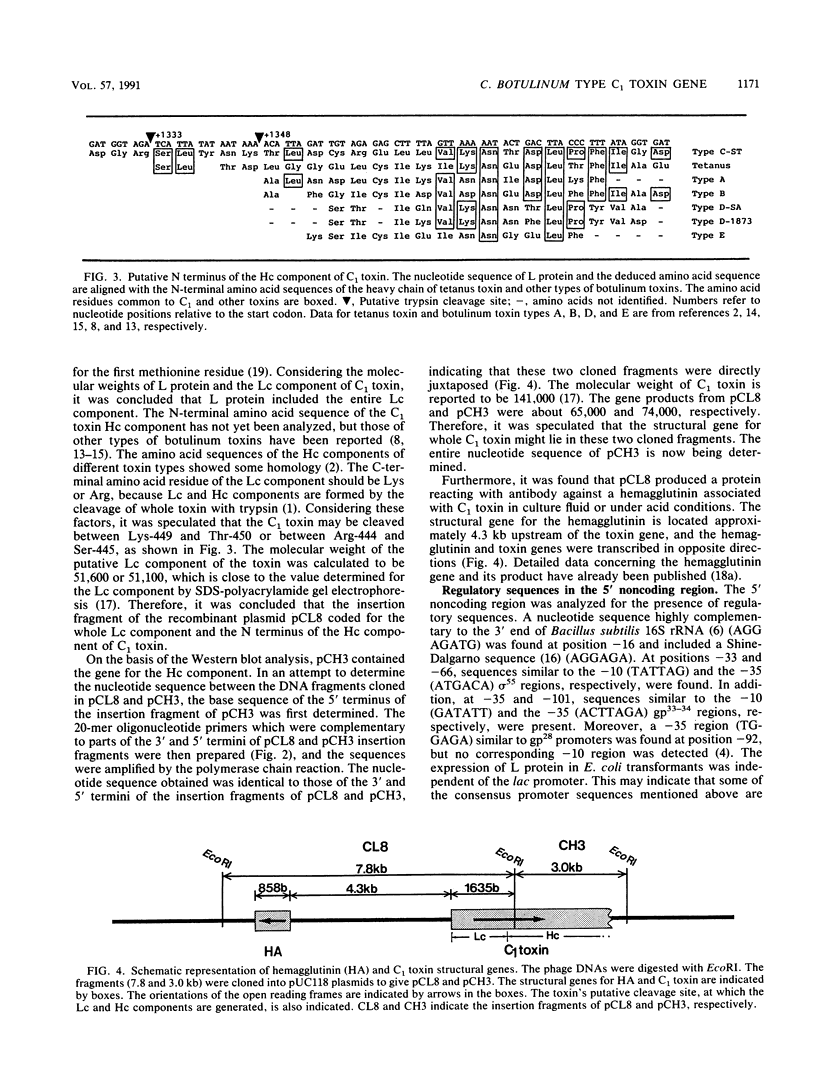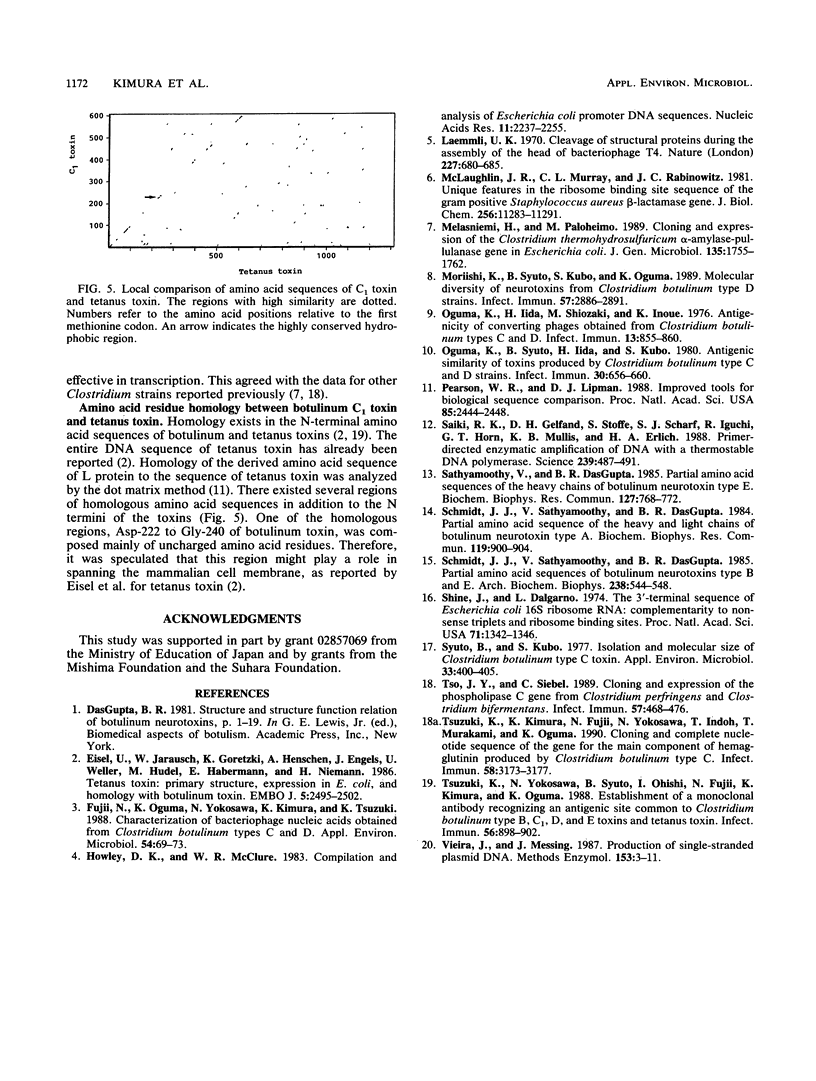Abstract
The toxigenicity of Clostridium botulinum type C1 is mediated by specific bacteriophages. DNA was extracted from one of these phages. Two DNA fragments, 3 and 7.8 kb, which produced the protein reacting with antitoxin serum were cloned by using bacteriophage lambda gt11 and Escherichia coli. Both DNA fragments were then subcloned into pUC118 plasmids and transferred into E. coli cells. The nucleotide sequences of the cloned DNA fragments were analyzed by the dideoxy chain termination method, and their gene products were analyzed by Western immunoblot. The 7.8-kb fragment coded for the entire light chain component and the N terminus of the heavy chain component of the toxin, whereas the 3-kb fragment coded for the remaining heavy chain component. The entire nucleotide sequence for the light chain component was determined, and the derived amino acid sequence was compared with that of tetanus toxin. It was found that the light chain component of C1 toxin possessed several amino acid regions, in addition to the N terminus, that were homologous to tetanus toxin.
Full text
PDF




Images in this article
Selected References
These references are in PubMed. This may not be the complete list of references from this article.
- Eisel U., Jarausch W., Goretzki K., Henschen A., Engels J., Weller U., Hudel M., Habermann E., Niemann H. Tetanus toxin: primary structure, expression in E. coli, and homology with botulinum toxins. EMBO J. 1986 Oct;5(10):2495–2502. doi: 10.1002/j.1460-2075.1986.tb04527.x. [DOI] [PMC free article] [PubMed] [Google Scholar]
- Fujii N., Oguma K., Yokosawa N., Kimura K., Tsuzuki K. Characterization of bacteriophage nucleic acids obtained from Clostridium botulinum types C and D. Appl Environ Microbiol. 1988 Jan;54(1):69–73. doi: 10.1128/aem.54.1.69-73.1988. [DOI] [PMC free article] [PubMed] [Google Scholar]
- Hawley D. K., McClure W. R. Compilation and analysis of Escherichia coli promoter DNA sequences. Nucleic Acids Res. 1983 Apr 25;11(8):2237–2255. doi: 10.1093/nar/11.8.2237. [DOI] [PMC free article] [PubMed] [Google Scholar]
- Laemmli U. K. Cleavage of structural proteins during the assembly of the head of bacteriophage T4. Nature. 1970 Aug 15;227(5259):680–685. doi: 10.1038/227680a0. [DOI] [PubMed] [Google Scholar]
- McLaughlin J. R., Murray C. L., Rabinowitz J. C. Unique features in the ribosome binding site sequence of the gram-positive Staphylococcus aureus beta-lactamase gene. J Biol Chem. 1981 Nov 10;256(21):11283–11291. [PubMed] [Google Scholar]
- Melasniemi H., Paloheimo M. Cloning and expression of the Clostridium thermohydrosulfuricum alpha-amylase-pullulanase gene in Escherichia coli. J Gen Microbiol. 1989 Jun;135(6):1755–1762. doi: 10.1099/00221287-135-6-1755. [DOI] [PubMed] [Google Scholar]
- Moriishi K., Syuto B., Kubo S., Oguma K. Molecular diversity of neurotoxins from Clostridium botulinum type D strains. Infect Immun. 1989 Sep;57(9):2886–2891. doi: 10.1128/iai.57.9.2886-2891.1989. [DOI] [PMC free article] [PubMed] [Google Scholar]
- Oguma K., Iida H., Shiozaki M., Inoue K. Antigenicity of converting phages obtained from Clostridium botulinum types C and D. Infect Immun. 1976 Mar;13(3):855–860. doi: 10.1128/iai.13.3.855-860.1976. [DOI] [PMC free article] [PubMed] [Google Scholar]
- Oguma K., Syuto B., Iida H., Kubo S. Antigenic similarity of toxins produced by Clostridium botulinum type C and D strains. Infect Immun. 1980 Dec;30(3):656–660. doi: 10.1128/iai.30.3.656-660.1980. [DOI] [PMC free article] [PubMed] [Google Scholar]
- Pearson W. R., Lipman D. J. Improved tools for biological sequence comparison. Proc Natl Acad Sci U S A. 1988 Apr;85(8):2444–2448. doi: 10.1073/pnas.85.8.2444. [DOI] [PMC free article] [PubMed] [Google Scholar]
- Saiki R. K., Gelfand D. H., Stoffel S., Scharf S. J., Higuchi R., Horn G. T., Mullis K. B., Erlich H. A. Primer-directed enzymatic amplification of DNA with a thermostable DNA polymerase. Science. 1988 Jan 29;239(4839):487–491. doi: 10.1126/science.2448875. [DOI] [PubMed] [Google Scholar]
- Sathyamoorthy V., DasGupta B. R. Partial amino acid sequences of the heavy and light chains of botulinum neurotoxin type E. Biochem Biophys Res Commun. 1985 Mar 29;127(3):768–772. doi: 10.1016/s0006-291x(85)80009-7. [DOI] [PubMed] [Google Scholar]
- Schmidt J. J., Sathyamoorthy V., DasGupta B. R. Partial amino acid sequence of the heavy and light chains of botulinum neurotoxin type A. Biochem Biophys Res Commun. 1984 Mar 30;119(3):900–904. doi: 10.1016/0006-291x(84)90858-1. [DOI] [PubMed] [Google Scholar]
- Schmidt J. J., Sathyamoorthy V., DasGupta B. R. Partial amino acid sequences of botulinum neurotoxins types B and E. Arch Biochem Biophys. 1985 May 1;238(2):544–548. doi: 10.1016/0003-9861(85)90198-5. [DOI] [PubMed] [Google Scholar]
- Shine J., Dalgarno L. The 3'-terminal sequence of Escherichia coli 16S ribosomal RNA: complementarity to nonsense triplets and ribosome binding sites. Proc Natl Acad Sci U S A. 1974 Apr;71(4):1342–1346. doi: 10.1073/pnas.71.4.1342. [DOI] [PMC free article] [PubMed] [Google Scholar]
- Syuto B., Kubo S. Isolation and molecular size of Clostridium botulinum type C toxin. Appl Environ Microbiol. 1977 Feb;33(2):400–405. doi: 10.1128/aem.33.2.400-405.1977. [DOI] [PMC free article] [PubMed] [Google Scholar]
- Tso J. Y., Siebel C. Cloning and expression of the phospholipase C gene from Clostridium perfringens and Clostridium bifermentans. Infect Immun. 1989 Feb;57(2):468–476. doi: 10.1128/iai.57.2.468-476.1989. [DOI] [PMC free article] [PubMed] [Google Scholar]
- Tsuzuki K., Kimura K., Fujii N., Yokosawa N., Indoh T., Murakami T., Oguma K. Cloning and complete nucleotide sequence of the gene for the main component of hemagglutinin produced by Clostridium botulinum type C. Infect Immun. 1990 Oct;58(10):3173–3177. doi: 10.1128/iai.58.10.3173-3177.1990. [DOI] [PMC free article] [PubMed] [Google Scholar]
- Tsuzuki K., Yokosawa N., Syuto B., Ohishi I., Fujii N., Kimura K., Oguma K. Establishment of a monoclonal antibody recognizing an antigenic site common to Clostridium botulinum type B, C1, D, and E toxins and tetanus toxin. Infect Immun. 1988 Apr;56(4):898–902. doi: 10.1128/iai.56.4.898-902.1988. [DOI] [PMC free article] [PubMed] [Google Scholar]
- Vieira J., Messing J. Production of single-stranded plasmid DNA. Methods Enzymol. 1987;153:3–11. doi: 10.1016/0076-6879(87)53044-0. [DOI] [PubMed] [Google Scholar]



